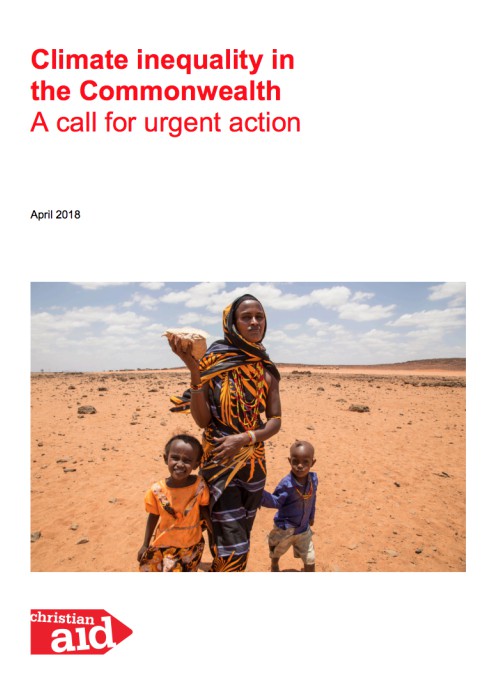'Richer nations shirking climate responsibilities'
The Commonwealth’s richer nations are shirking their responsibilities in the global effort to tackle climate change, while the bloc’s poorer members are picking up the slack, according to a new report from development charity Christian Aid
 The study, Climate inequality in the Commonwealth, assesses the pledges to the Paris Agreement of each Commonwealth country and measures them against national capacity and historic emissions (since 1990) to calculate their fair proportion of the effort to address climate change. The results show that the UK, Canada and Australia are in the red while poorer countries like Bangladesh, Kenya and Zambia are in credit. Small island states vulnerable to sea level rise like Kiribati, Vanuatu and Tuvalu are also more than doing their fair share.
The study, Climate inequality in the Commonwealth, assesses the pledges to the Paris Agreement of each Commonwealth country and measures them against national capacity and historic emissions (since 1990) to calculate their fair proportion of the effort to address climate change. The results show that the UK, Canada and Australia are in the red while poorer countries like Bangladesh, Kenya and Zambia are in credit. Small island states vulnerable to sea level rise like Kiribati, Vanuatu and Tuvalu are also more than doing their fair share.
The report's findings were released to coincide with this year’s Commonwealth Heads of Government Meeting (CHOGM), which started on Monday (16 April). The meeting was relocated to London from Vanuatu after the Pacific island’s infrastructure was too badly damaged by Cyclone Pam in 2015.
The findings do not make good reading for the UK - but there is an opportunity to make a huge difference by investing in renewables around the Commonwealth, said report author Mohamed Adow.
'The UK claims to stand in solidarity with its Commonwealth allies, but when it comes to one of the gravest threats to member nations, it is shirking its responsibilities,' said Mr Adow, Christian Aid’s International Climate Lead.
'The UK is proud of the shared values between the ‘family of nations’ but it is not pulling its weight and instead is leaving the heavy lifting to much poorer countries. For Britain, the host country, which claims to care for both the climate and the Commonwealth, it risks being embarrassing if it doesn’t step up its game.'
On a per capita basis the UK burns more carbon dioxide than 18 Commonwealth countries combined. Mr Adow explained that the UK could turn this state of affairs into 'an opportunity to do its fair share while eradicating energy poverty in the Commonwealth'.
Due to its relative wealth and the fact its emissions since 1990 are so high, the UK cannot do its fair share of the global effort to roll back emissions solely within its own borders; it also needs to help displace emissions elsewhere. By investing in renewables in energy poor Commonwealth countries, Britain can tackle climate change and boost the fortunes of the world’s most needy at the same time.
To meet its obligations the UK needs to mitigate 700 metric tonnes of C02 internationally by 2030, which equates to 1,730 terawatt hours of renewable electricity. This alone would almost eradicate energy poverty in the Commonwealth, which stands at a needed 2,050 terawatt hours.
Mr Adow said, 'Britain has a long history of industrial innovation and helping bring light and power to the remotest parts of the world would be an achievement worthy of a nation which claims to be a climate leader. Together, the UK and Canada, which founded the Powering Past Coal Alliance, could eradicate energy poverty across the Commonwealth.'
He added, 'As the UK readies itself for departing the EU there has been much talk about the importance of trade and other collaboration within the Commonwealth. What better way of boosting the fortunes of its future trading partners by tackling climate change and bringing power to those that need it?'
CHOGM comes at a 'perfect moment' to kickstart an important year for the climate, said the charity. In December the world meets in Poland as part of the Talanoa Dialogue, the review process where countries will begin to strengthen the initial pledges made under the Paris Agreement. Currently the accord will only keep global temperature rise to between 2.7 C and 3.5 C, much higher than the 1.5 C rise that the world has agreed to try and limit it to.
 The Summer 2018 edition of Baptists Together magazine has a climate change focus.
The Summer 2018 edition of Baptists Together magazine has a climate change focus.
Baptist Times, 16/04/2018